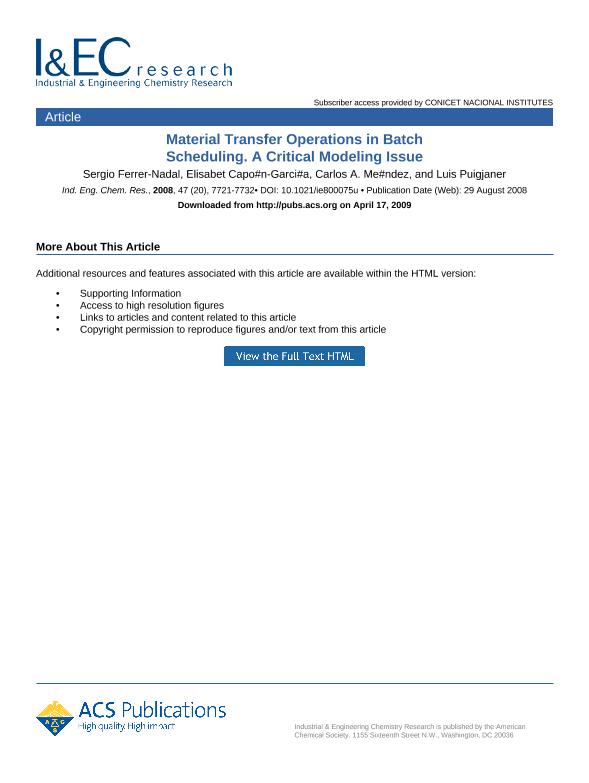Mostrar el registro sencillo del ítem
dc.contributor.author
Ferrer Nadal, Sergio
dc.contributor.author
Capon Garcia, Elisabet
dc.contributor.author
Mendez, Carlos Alberto

dc.contributor.author
Puigjaner, Luis
dc.date.available
2017-07-14T14:13:50Z
dc.date.issued
2008-12
dc.identifier.citation
Ferrer Nadal, Sergio; Capon Garcia, Elisabet; Mendez, Carlos Alberto; Puigjaner, Luis; Material Transfer Operations in Batch Scheduling: A Critical Modeling Issue; American Chemical Society; Industrial & Engineering Chemical Research; 47; 12-2008; 7721-7732
dc.identifier.issn
0888-5885
dc.identifier.uri
http://hdl.handle.net/11336/20496
dc.description.abstract
An effective short-term scheduling formulation must simultaneously deal with several problem difficulties commonly arising in batch processes operations. One of the key features to be considered is the representation of the material transfer operations between process stages. A nonzero time as well as certain conditions and resources are always required to move the material from one processing stage to the next one according to the specified product recipe. The transfer task consumes a period of time during which a proper synchronization of the equipment units supplying and receiving the material is enforced. Synchronization implies that during the execution of the transfer task, one unit will be supplying the material whereas the other one will be receiving it and consequently, no other task can be simultaneously performed in both units. Most of the existing mixed-integer linear programming (MILP) optimization approaches have traditionally dealt with the batch scheduling problem assuming zero transfer times, and consequently no synchronization, between consecutive processing stages. Simplification relying on negligible transfer times may work properly for the scheduling of multiproduct batch plants with similar product recipes; however, it is demonstrated in this work that ignoring the important role of transfer times may seriously compromise the feasibility of the scheduling whenever shared units and storage tanks, material recycles, or bidirectional flows of products are to be considered. To overcome the serious limitations of current MILP-based scheduling approaches, a general precedence-based framework accounting for nonzero transfer times is introduced. Also, two alternative methods that avoid generating unfeasible schedules are proposed and tested in different case studies.
dc.format
application/pdf
dc.language.iso
eng
dc.publisher
American Chemical Society

dc.rights
info:eu-repo/semantics/openAccess
dc.rights.uri
https://creativecommons.org/licenses/by-nc-sa/2.5/ar/
dc.subject
Scheduling
dc.subject
Optimization
dc.subject
Storage Policies
dc.subject
Milp Models
dc.subject.classification
Ingeniería Química

dc.subject.classification
Ingeniería Química

dc.subject.classification
INGENIERÍAS Y TECNOLOGÍAS

dc.title
Material Transfer Operations in Batch Scheduling: A Critical Modeling Issue
dc.type
info:eu-repo/semantics/article
dc.type
info:ar-repo/semantics/artículo
dc.type
info:eu-repo/semantics/publishedVersion
dc.date.updated
2017-07-10T13:10:09Z
dc.journal.volume
47
dc.journal.pagination
7721-7732
dc.journal.pais
Estados Unidos

dc.journal.ciudad
Columbus
dc.description.fil
Fil: Ferrer Nadal, Sergio. Universitat Politecnica de Catalunya; España
dc.description.fil
Fil: Capon Garcia, Elisabet. Universitat Politecnica de Catalunya; España
dc.description.fil
Fil: Mendez, Carlos Alberto. Consejo Nacional de Investigaciones Científicas y Técnicas. Centro Científico Tecnológico Conicet - Santa Fe. Instituto de Desarrollo Tecnológico para la Industria Química. Universidad Nacional del Litoral. Instituto de Desarrollo Tecnológico para la Industria Química; Argentina
dc.description.fil
Fil: Puigjaner, Luis. Universitat Politecnica de Catalunya; España
dc.journal.title
Industrial & Engineering Chemical Research

dc.relation.alternativeid
info:eu-repo/semantics/altIdentifier/doi/http://dx.doi.org/10.1021/ie800075u
dc.relation.alternativeid
info:eu-repo/semantics/altIdentifier/url/http://pubs.acs.org/doi/abs/10.1021/ie800075u
Archivos asociados
